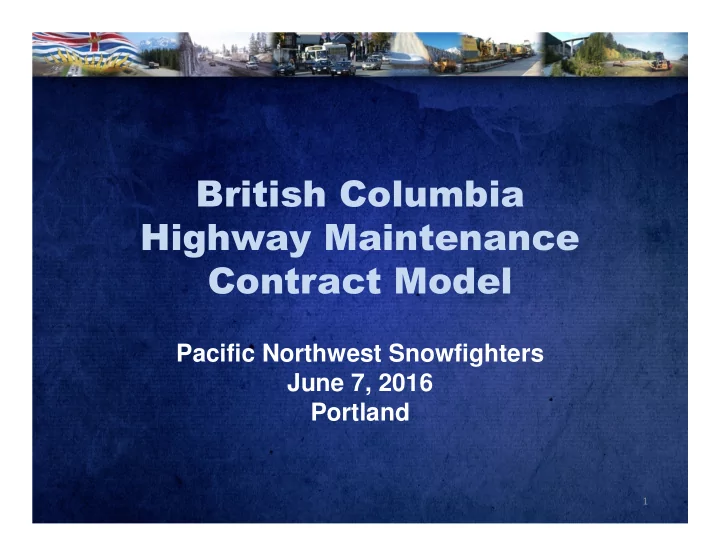

British Columbia Highway Maintenance Contract Model Pacific Northwest Snowfighters June 7, 2016 Portland 1
Investment in Infrastructure • Capital Expansion – $300-400 million • Rehabilitation – $325 million • Maintenance – $400 million (Highway Maint.) – $11 million (Pavement Marking) – $10 million (Electrical Maintenance)
Contract Scope • Maintenance of: – 47,000 road km of highways and side roads (91,000 lane km) – 2,800 structures • 60% of highways are hard surfaced, 40% are gravel/dirt roads • Includes roads within unincorporated areas • Does not include roads within municipalities
Service Areas • 28 Service Areas • 14 Contractors • Average lane km: 3,250 – Smallest: 600 lane km (SA27 – North Coast) – Largest: 7,000 lane km (SA22 – North Peace) • Limit of 4 Service Areas per Contractor
Contracting History • Privatized highway maintenance in 1988 • In our 4 th round of contracts • Changes that have occurred over time: – Length of contract term: 3-5-10 – Contract language & specs: prescriptive to performance • Current contracts were tendered in 2003/04
Contract Highlights • Long term contracts – originally 10 years but were extended to 15 • Performance based, or end product specifications • Contractor supplies equipment, workforce and maintenance yards • Government supplies gravel sources • Contractor is responsible for quality • Must provide a Quality Management system (QMS) • Government performs quality audits and daily monitoring
Contract Highlights • Lump sum contract comprised of two parts: – Routine Work • Work is hard to quantify, or very cyclical • Higher risk to contractor – Quantified work • Work is easy to quantify • Risk to contractor is lower
Routine Activities • All winter maintenance – Snow plowing – Sanding – Salting • Some summer maintenance – Bridge cleaning – Sweeping • Temporary maintenance – Temporary pothole patching – Temporary bridge repairs • Patrol and inspection
Quantified Activities • Surface Maintenance – Permanent patching – Grading – Shoulder Maintenance • Roadside Maintenance • Drainage Appliance Maintenance • Sign Maintenance • Bridge Maintenance
Estimated Cost Breakdown
Excluded Activities • Pavement Marking • Electrical Maintenance • Snow Avalanche Control • Rock Scaling • Engineering • Rehabilitation • Expansion Projects
Service Levels/Road Classifications • Service levels determined by: – 8 summer classes – 6 winter classes • Based on: – Type and volume of traffic – Routes and use • School buses • Industrial • hospitals • Higher classification warrants higher service level
Specifications • End-product approach • Limited the use of methods, procedures • Examples – Maximum snow accumulations – Response times
Winter Maintenance • Emphasis on pro-active approach and local stakeholder needs • Contractor assumes risk for winter weather related events/work – Continuous weather events – Longer than normal winter periods
Summer/Quantified Maintenance • Contractor submits annual plan • Reviewed by district offices • Quantities for various items can be traded value for value based on needs of the infrastructure – ie: in a dry year may trade mowing credits for dust control – We may allow a contractor to carry over patching credits over a couple of years to allow contractor to benefit from economies of scale
Emergencies • Includes rock/mud slides, floods/washouts and structure damage • Financial caps protect the contractor • Work up to the caps is routine • Work beyond the caps is cost plus
Additional Work • Some activities have financial caps (drainage maintenance, bridge work) • Work beyond the cap is usually assigned to the contractor and paid at cost plus
Quality Management System (QMS) • Contractors must follow the principles of the ISO 9000:2000 standard – No requirement to be ISO certified • Contractor is responsible for ensuring quality
MoTI Administration • 3 Regions / 11 Districts • Contracts administered by: – Approx 100 Area Managers – Report to 21 Operations Managers – 11 District Transportation Managers • 3 Regional Directors involved at a higher level
Quality Plan • Monitoring – Staff look at the state of the infrastructure on a daily basis – Note work being done as well as deficiencies – 11 District Transportation Managers • 3 Regional Directors involved at a higher level
Audits • 3 types of audits – Local audits by Area Managers on a regular basis – 2 regional audits (summer & winter) done by staff from another District – Stakeholder assessment audits • Police, fire depts. trucking firms etc. • Results of audits feed into the Contractor Assessment Program (CAP)
Contractor Assessment Program • Objectives – Encourage contractors to exceed minimum requirements – Reward outstanding contractors • Rate contractors based on – 50% of local audit – 30% on regional audit – 20% on stakeholder assessment • Potentially 2% of annual contract price available – $13.5M contract, performance payment could be $270K
Tendering Approach • RFP using upset pricing – Allows setting and controlling of operations budget – Price is adjusted annually to account for inflation • Labour • Fuel • Non-Residential Construction Index • Third party documents – Insurance, bonding requirements • 2 envelope system – Service proposal (QMS and local knowledge) worth 30% – Price, worth 70%
Upcoming Contract Renewal • One contract will expire this September – Just completed RFP process and chosen a preferred proponent – Used a slightly updated version of the existing contract • Remaining 27 Service Areas will expire in 2018/19 – Undertaking the renewal process now
Project Governance
Key Milestone Dates • End of Aug 2016: Board approval of working Group options • End of October 2016: Presentation to cabinet • Early Dec. 2016: Treasury Board submission • March 19 th , 2017: Writ of election issued • May 9 th , 2017: Next Provincial election • July 31 st , 2017: First 8 RFPs on BC Bid • Aug 31 st , 2018: First 8 contracts expire
For Further Information • Boilerplate contract agreement and specifications and other maintenance related info available at: • http://www2.gov.bc.ca/gov/content/transportation/transportation- infrastructure/contracting-to-transportation/highway-bridge-maintenance • Contact: Ian Pilkington at: • Ian.Pilkington@gov.bc.ca • Or call (250) 387-7627
Questions?
Recommend
More recommend